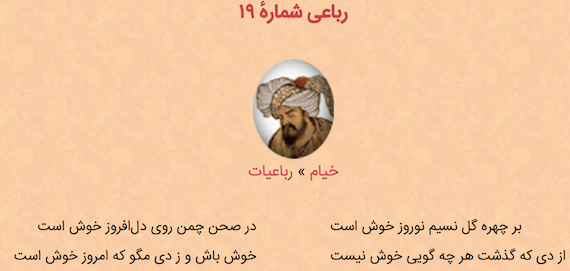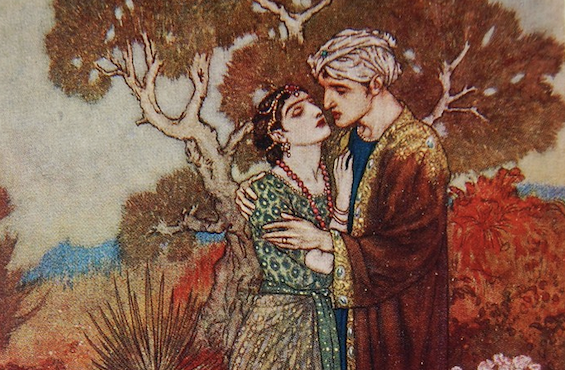Ann Arbor (Informed Comment) –
I am rewriting a previous essay here and adding some new translations. The world has seen a lot of misery this past year, I thought it might be nice to talk about poetry and rebirth today.
In 2020, I brought out a new translation of the Rubaiyat of Omar Khayyam, which one reviewer called “aggressively modern.” The poetry had been made famous by the rendering of the Victorian translator, Edward FitzGerald. The quatrains or Rubaiyat attributed to the medieval astronomer Omar Khayyam (d. 1131), four-line Persian poems, are often about renewal, and some make special mention of New Year’s Day (Now-Ruz in Persian).
Here’s the thing: in ancient, Zoroastrian, Iran, New Year’s Day was celebrated on the vernal equinox (21 or 20 March). So although in all cultures, New Year’s is a time of renewal and rebirth, in Iran it coincides with the beginning of spring and not just, as in Christian culture, the beginning of the end of winter.
In the first poem, below, I substituted “spring” for Now Ruz, since the spring references with regard to the New Year would have been confusing for Anglophone audiences. But it is in the original a “New Year’s breeze.” I know that the Persian Now-Ruz or New Year isn’t the same as the Western, which falls soon after the winter solstice. But there is nothing wrong with dreaming on our New Year about the Persian one and its springtime greenery.
Here’s the poem:
The spring breeze on a rose’s cheek spreads joy.
The face you glimpse beyond the blooms grants bliss.
No words about last winter can bring cheer;
don’t speak of yesterday —- rejoice today.

h/t ganjoor.net.
Another poem with this theme that some have attributed to Khayyam (it is not in my book) goes this way:
When New Year’s clouds wash clean the tulip’s face
Then for your resolution wine’s a must.
For this green lawn that so delights our eyes
Will grow tomorrow from our very dust.
چون ابر به نوروز رخ لاله بشست
برخیز و به جام باده کن عزم درست
کاین سبزه که امروز تماشاگه ماست
فردا همه از خاک تو برخواهد رست
People have always partied on the New Year, and medieval Iran was no exception. This poetry is the opposite of the puritanical ideology we often hear from the Middle East, but anyone who has actually lived there knows that the stereotype of sober religiousness is just that. This poetry urges people to have a good time while they still can:
Deep in my dream, I heard a sage cry out:
“What joy has slumber ever caused to bloom?
Why do a thing that looks so much like death?
Go drinking! Lifetimes soon will pass in sleep!”
Shaboozey and his “Tipsy” have nothing on Omar Khayyam.

Illustration for the Rubaiyat of Omar Khayyam by Edmund Dulac. Public Domain.
Another poem referring to New Year’s Day is this:
On New Year, like a tulip, raise a glass
with someone pretty if you get the chance.
Drink wine with joy! The ancient heavens turn —
they’ll cast you down like dust as they advance.
چون لاله به نوروز قدح گیر بدست
با لاله رخی اگر ترا فرصت هست
می نوش بخرمی که این چرخ کهن
ناگاه تو را چون خاک گرداند پست
The ancient Persians believed that the sky was a hard lapis lazuli vault that turned against the earth, crushing its surface, so as the days and years go by it crushes humans into dust. (This one is also not in my book. A lot of poems are attributed to Khayyam, who was a “frame author.”)
While clear-eyed about how short life is and our ultimate fate, the poetry urges against dwelling on on the downside of mortality. Awareness of it should instead impel us to become joyous and make every moment count.
Since we can’t trust tomorrow,
find a way to fill this lovelorn heart with joy:
Drink up in the light of the moon– a moon that someday
will look for us …and not find us.
The moon won’t find so many after the grim last year of wars, but those of us it can still descry must find a way to fill our lovelorn hearts with joy in the new year.
Order from
or Literati Bookstore in Ann Arbor, who will ship it to you
or Barnes and Noble, who will ship it to you.
or Amazon
Reviews:
“’To read Juan Cole’s deft, plain-spoken translation of the Rubáiyát
is to find companionship, to rejoin a thousand-year human
conversation about how to endure, enjoy, and find a fleeting beauty
in everlastingly dire times. The lucid, cogent and mind-opening
Epilogue is a kind of grace, a gift freely given, from one of our
most astonishing and generous intellects.’”
– Michael Chabon, Pulitzer Prize winner and author of Moonglow (2017)
“’Omar Khayyam is a Persian treasure and Juan Cole’s new
translation brings him anew to Western audiences who
for centuries have been both delighted and educated by this
medieval sage! Reading The Rubáiyát is a thrill – you feel the
echoes of the 12th century seamlessly into our 21st, as this is
a holy book of wisdom and magic. In another perilous era for
Iranians, it’s wonderful to see this enchanting volume make
its way through the world yet again!’”
– Porochista Khakpour, novelist, essayist and author of Brown Album (2020)
Featured Illustration: screenshot from a work of Abdur Rahman Chughtai.


 © 2025 All Rights Reserved
© 2025 All Rights Reserved